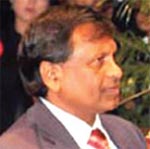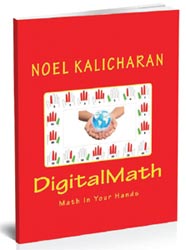 |
 |
 |
|
September 2012 |
We’ve all grown up with the notion that we can count to ten on our fingers. By counting the joints, we can go a bit further. With DigitalMath, you can easily and quickly count up to 99 and beyond without taking off your shoes. But it’s not really about counting. It’s about being able to do real arithmetic (addition, subtraction, multiplication and division) using only the fingers of both hands. For example, can you add the numbers: 4, 9, 5, 8, 3, 7, 9, 8, 8, 6, 5 as fast as they are called or multiply 48 x 8 or 89 x 7 quickly? After just a few hours with DigitalMath, you will be able to do these and more quickly and accurately, in fact, faster than someone using a calculator, says Dr Kalicharan.
Two things stood out. One was that almost all the children were giving the correct answers to the problems. This was a far cry from the typical class where only the brighter students usually answer. The second was that they all seemed to be enjoying what they were doing. How often can you say that about a typical math class? “Numbers play a big part in our everyday lives and those who are good with numbers are normally regarded as more intelligent than those who aren’t. This becomes a self-fulfilling prophecy. The book gives everyone a unique opportunity to become good with numbers,” says Dr Kalicharan. He believes that those who say they dislike, or even hate, mathematics really hate the idea of not being able to do it well. Most likely, they had difficulties early on and these were never resolved. If we try our hand at something and we fail, we don’t try so hard the next time, especially if our efforts are ridiculed and discouraged by teachers, parents and peers. So we fail again. After a little while, we give up, thinking we are no good at this. It is this emotional and mental road-block, not lack of ability that prevents most of us from doing well in mathematics, he says. The state of numeracy in most countries is abysmally low. Untold billions of dollars have been spent trying to redress this, but the problem seems to be getting worse. DigitalMath is the new fun kid on the block and, with it, Dr Kalicharan hopes to have everyone tapping away on their fingers while they learn to perform the elusive operations of arithmetic with speed and accuracy. |


 Dr Noel Kalicharan, Senior Lecturer in Computer Science, recently published his seventeenth book, “DigitalMath – Math In Your Hands.” His other 16 have been in computer science, this being his first in mathematics and, in particular, arithmetic. And even though some of his computing books are used at several universities around the world, he thinks that DigitalMath could be his most important work. Why? Because it has the potential to revolutionize the way everyone, of all ages, does arithmetic.
Dr Noel Kalicharan, Senior Lecturer in Computer Science, recently published his seventeenth book, “DigitalMath – Math In Your Hands.” His other 16 have been in computer science, this being his first in mathematics and, in particular, arithmetic. And even though some of his computing books are used at several universities around the world, he thinks that DigitalMath could be his most important work. Why? Because it has the potential to revolutionize the way everyone, of all ages, does arithmetic. He worked with nine and ten-year-old students of Jordan Hill Presbyterian School during the last week of the school term and the first few weeks of the vacation, two to four hours per week. A video of the students doing fairly complex calculations with amazing speed and accuracy is impressive. (You can see it here https://docs.google.com/open?id=0BzCwv8VO4MpYenZ2a1F6dHNoVTA)
He worked with nine and ten-year-old students of Jordan Hill Presbyterian School during the last week of the school term and the first few weeks of the vacation, two to four hours per week. A video of the students doing fairly complex calculations with amazing speed and accuracy is impressive. (You can see it here https://docs.google.com/open?id=0BzCwv8VO4MpYenZ2a1F6dHNoVTA)